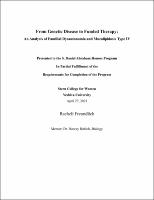Please use this identifier to cite or link to this item:
https://hdl.handle.net/20.500.12202/6866| Title: | From Genetic Disease to Funded Therapy: An Analysis of Familial Dysautonomia and Mucolipidosis Type IV |
| Authors: | Babich, Harvey Freundlich, Racheli |
| Keywords: | genetic disease funded therapy Familial Dysautonomia Mucolipidosis Type IV |
| Issue Date: | 27-Apr-2021 |
| Citation: | Freundlich, R. (2021). From Genetic Disease to Funded Therapy: An Analysis of Familial Dysautonomia and Mucolipidosis Type IV [Bachelor's honors thesis, Yeshiva University]. |
| Abstract: | The Jewish Ashkenazic community is affected by many genetic diseases, some of which are devastating to the individual and to the well-functioning of the family. Regrettably, there are many recessive genetic disorders for which Ashkenazic Jews are carriers, thereby creating the possibility of transmitting the disease to their offspring. It is estimated that about 1 in 4 Ashkenazic Jews is a carrier for at least one genetic disorder. Diseases like Tay Sachs and Gaucher disease are recognized as posing significant risk due to their high frequency in the Jewish Ashkenazic community, with the heterozygote frequency of 1:29 for Tay Sachs disease (TSD) and 1:16 for Gaucher disease (GD). Thankfully, today it is much less common to find these disorders in Jewish communities due to genetic testing and progressive biomedical research which enabled the prevention of these diseases from manifesting themselves. Unfortunately, there are yet many other genetic diseases which affect families, sometimes undermining the family structure. Two such diseases, both of which are devastating and life-threatening, are Familial Dysautonomia (FD) and Mucolipidosis Type IV (ML4), with a heterozygote frequency of 1:29 for FD and of 1:67 for ML4. As with TSD, both FD and ML4 are lysosomal storage diseases which interrupt the metabolic processes in neurons of affected individuals. Although these latter two diseases are not as commonly known as TSD and GD, they are extremely significant to those born with these health issues, presenting horrific realities to affected families and loved ones. This paper evaluates FD and ML4 regarding those biochemical pathways adversely affected by the disease-causing mutations. Additionally, current research and treatment options will be discussed to better understand the possibilities of therapy for those afflicted with the diseases. Lastly, to present a more total overview of the health issues, attention will turn to funding the research needed to develop the appropriate therapies. As grants are the backbone of research, this paper will examine two ways in which researchers secure funding. With proper support, researchers can better grasp the nature of FD and ML4, which in turn will lead to better treatments and therapies for those afflicted by these disorders. |
| Description: | Senior honors thesis / Embargo until 27 April 2023 |
| URI: | https://hdl.handle.net/20.500.12202/6866 |
| Appears in Collections: | S. Daniel Abraham Honors Student Theses |
Files in This Item:
| File | Description | Size | Format | |
|---|---|---|---|---|
| Freundlich Racheli EMBARGO 27April 2021 to 2023 From Genetic Disease.pdf | 2.01 MB | Adobe PDF |  View/Open |
This item is licensed under a Creative Commons License

